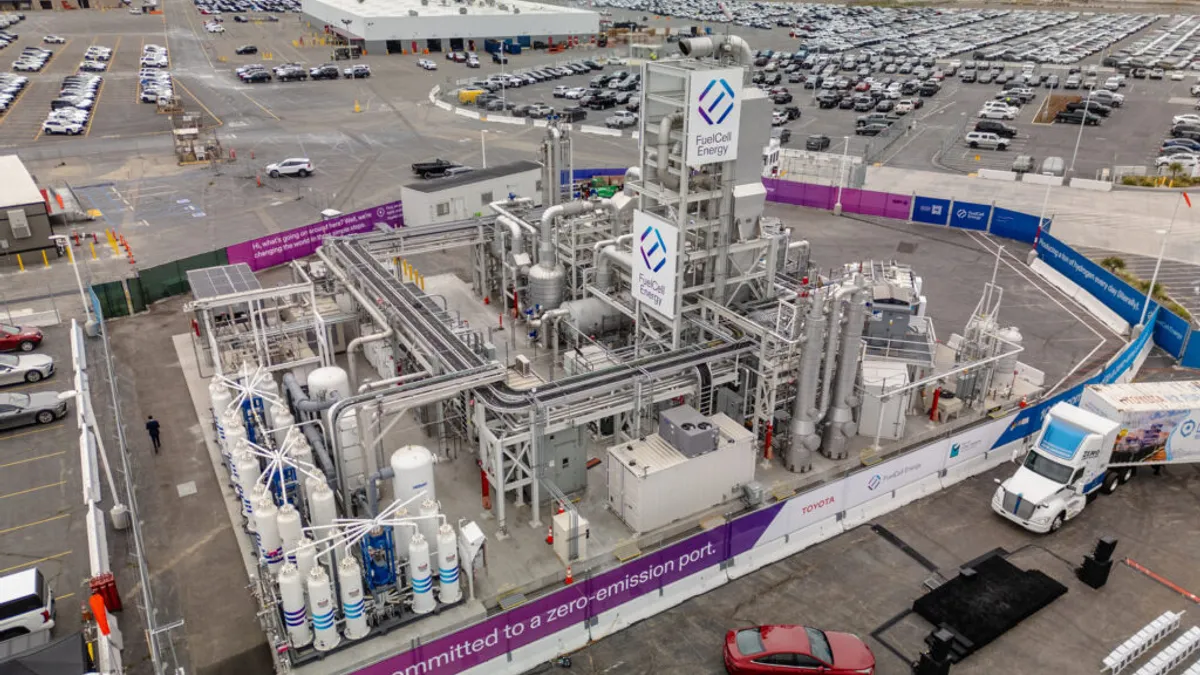Toyota Motor North America and FuelCell Energy opened a renewable energy system to power the automaker’s logistics operations at the Port of Long Beach, according to the port’s May 2 press release. Called “Tri-gen,” the system produces renewable electricity, renewable hydrogen and usable water from biogas.
Toyota believes Tri-gen to be a “first-of-its-kind” system, per the release. The automaker aims to use the lessons from the POLB operation to potentially replicate aspects of it throughout the country, a spokesperson told Supply Chain Dive in an email.
“Tri-gen is truly unique, as there is not another facility of this kind that we’re aware of in the world. Since the facility is just coming online, we’ll study the learnings from the project and evaluate the opportunities to apply this technology and its variations throughout our North American portfolio, not just at port facilities,” the spokesperson said.
The resources generated by the new system will support Toyota Logistics Services’ vehicle-processing and distribution center at the port. Toyota Logistics Services’ vehicle-processing and distribution center at the port. The logistics center is the facility’s largest processing facility in North America, and receives about 200,000 new Toyota and Lexus vehicles a year. It is also the company’s first facility to use renewable electricity generated 100% onsite, according to its press release.
Using biogas from California landfills, the system produces 2.3 megawatts of renewable electricity, some of which will be used to power the port facility, Toyota said in its press release. The excess will be delivered to a local utility.
Tri-gen also produces up to 1,200 kilograms of hydrogen per day, which will be used to fuel Toyota’s fuel cell electric Mirai vehicle models that are delivered to the port prior to being transported to dealerships, the spokesperson said. The hydrogen will also supply the nearby heavy-duty truck hydrogen fueling station that supports the company’s logistics and drayage operations.
Meanwhile, the up to 1,400 gallons of water per day — generated as a byproduct of the hydrogen — will be repurposed for TLS’ car wash operations. Doing so will reduce its impact on local water supplies by about 500,000 gallons a year.
Toyota is in pursuit of its “2050 challenge,” where it aims to become carbon neutral across the vehicle life cycle by that year, the spokesperson said. The concept of installing something like Tri-gen system at the port was first conceived almost a decade ago, though construction didn’t begin until the second half of 2021.
“The goal of our collaboration with FuelCell Energy was to find sustainable solutions for the TLS vehicle processing facility here at the Port of Long Beach as part of our goal to remove carbon dioxide emissions from our operations,” said Tom Stricker, Toyota’s group VP of sustainability and regulatory affairs, in the release.
Hydrogen has been gaining steam as a cleaner fuel over the past several years. Walmart is testing electric- and hydrogen-powered trucks. Railroads are collaborating on technology that can convert diesel-fueled locomotives to hydrogen.
Toyota said in its release that using hydrogen-powered Class 8 trucks in port operations could reduce diesel consumption by more than 420,000 gallons a year. Tri-gen can help avoid more than six tons of grid nitrogen oxide emissions.













